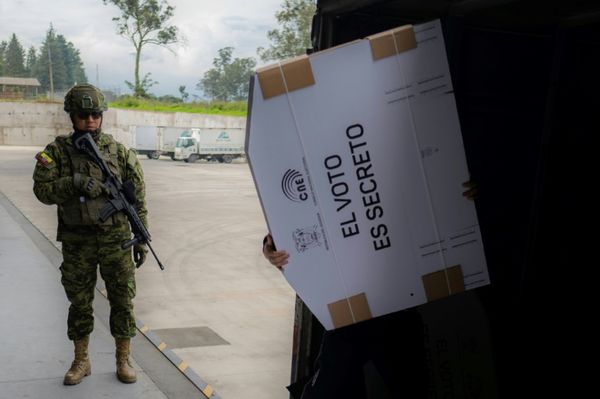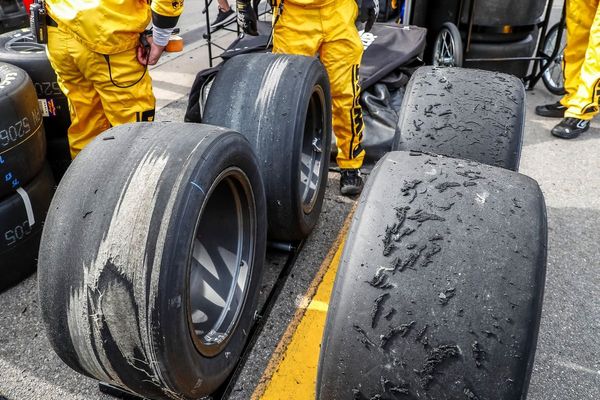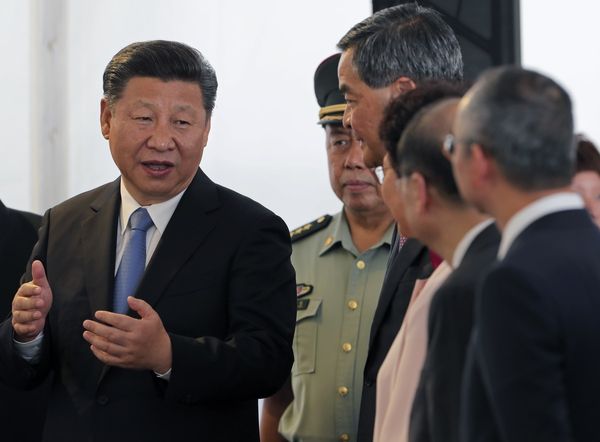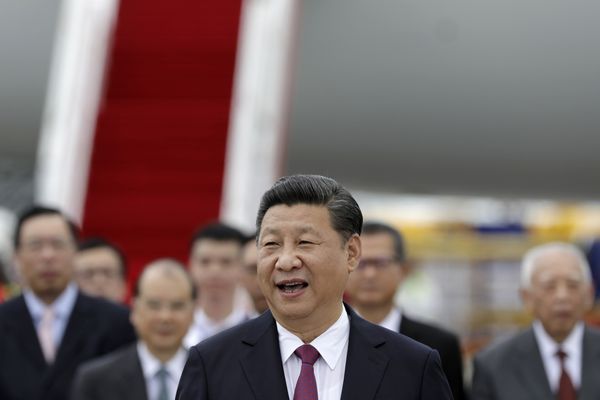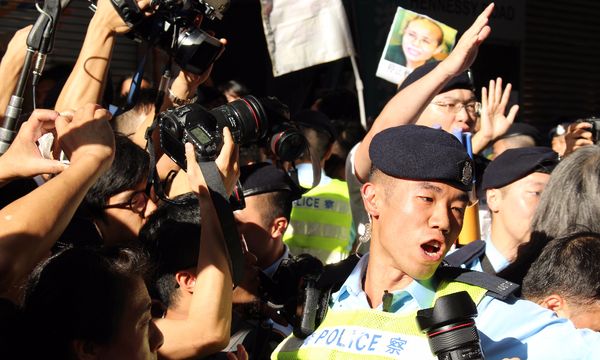
The Chinese president, Xi Jinping, has vowed to bring “new glory” to Hong Kong at the start of a highly sensitive three-day tour of the former British colony designed to celebrate the 20th anniversary of its return to China.
In a brief speech after landing at Hong Kong’s international airport on Thursday morning, the Communist party chief said he had come to “map out the future” of this semi-autonomous city of 7.3 million citizens.
“I’m pleased to have set foot in Hong Kong once again … Hong Kong has always been in my heart,” said China’s authoritarian leader, whose almost five years in power have coincided with the most politically volatile period in the city’s post-handover history.
Xi’s rare “inspection tour” – his first to Hong Kong since becoming China’s top leader in late 2012 – has been timed to coincide with celebrations of two decades since it was handed back to China, on 1 July 1997, after more than 150 years of British colonial rule.
Huge crowds are expected on Saturday, with mass pro-democracy demonstrations and a 23-minute pro-Beijing firework display over Victoria Harbour planned.
Swaths of the city have been placed under an unprecedented security lockdown, with military helicopters buzzing through the skies and about 11,000 police officers – more than a third of the city’s force – being deployed in an attempt to shelter Xi from the protesters.
The area surrounding Xi’s hotel, the Grand Hyatt, and the Hong Kong convention and exhibition centre, where the main handover anniversary ceremony will take place, have been isolated and surrounded by two-metre high water-filled barriers.
Speaking after his arrival, Xi said the celebrations of Hong Kong’s return to the “motherland” represented “a happy occasion for the country as well as for Hong Kong”. “I wholeheartedly wish Hong Kong will create a brighter future,” he added.

Boris Johnson, the UK’s foreign secretary, said the anniversary of Hong Kong’s return to Chinese control rule was “a moment to reflect on Hong Kong’s immense achievements as a thriving and dynamic city, serving as a gateway to the biggest and fastest-growing markets in the world”.
He added: “The rule of law, an independent judiciary, and a free media have all been central to Hong Kong’s success. As we look to the future, Britain hopes that Hong Kong will make more progress towards a fully democratic and accountable system of government.”
However, activists and protest leaders – some of whom were arrested on the eve of Xi’s arrival – said the presidential visit came at a bleak time.
“Demosisto, a political party founded after the 2014 umbrella protests by campaigners including Joshua Wong, tweeted:
Right across this celebratory skyscraper, we sit peacefully to tell the world: There’s nothing to celebrate. #HongKong is dying. pic.twitter.com/SW9dkNSia0
— Demosistō 香港眾志 (@demosisto) June 28, 2017
On Wednesday night protesters, including Wong, were arrested after storming a statue outside the building where Xi is expected to give a speech, unfurling banners calling for the release of Nobel peace prize laureate Liu Xiaobo, who was recently diagnosed with terminal liver cancer while in prison.
Under the “one country, two systems” formula agreed between Britain and China before handover, Hong Kong continues to enjoy far greater political freedoms than the authoritarian mainland, where a crackdown is under way.
However, activists say Xi’s reign has seen intensified efforts to thwart Hong Kong’s push for democracy as well as a growing erosion of the freedoms guaranteed to its citizens. The recent abduction of a group of local booksellers and the ousting of two democratically elected pro-independence lawmakers from Hong Kong’s parliament have reinforced fears that the city’s way of life is under siege.
“When democracy is not in sight, we need to take action to confront this system,” the Wong reportedly shouted as he was dragged into custody.
Martin Lee, a veteran democracy campaigner, urged Xi to use his visit to announce bold steps to win back the increasingly disillusioned hearts and minds of Hong Kong’s citizens, and particularly its youth. However, Lee, 79, said he feared Xi would spurn what was a “golden opportunity” to extend an olive branch to Hong Kong’s democracy movement.
“It’s so sad,” he told the Guardian. “If Xi Jinping doesn’t reverse the direction they are going in … then Hong Kong will soon become just another Chinese city – very quickly. There would be no dissent … no Joshua Wongs. That would be depressing. Hong Kong would not be Hong Kong.”

Reporters had limited access to Xi’s activities on his first day in Hong Kong but the president was reported to have met top local politicians, including outgoing chief executive, Leung Chun-ying, and his successor, Carrie Lam, visited an arts hub and been serenaded by two young Cantonese opera singers.
Jason Ng, a Hong Kong based author who has written a book about its young protest generation, said he expected Xi would be “wrapped in a bubble several blocks wide” during his stay. “He is being taken on a North Korea-style, highly controlled, completely contrived tour of Hong Kong where everything is rosy and every Hong Kong citizen adores Xi and loves China.”
But Ng predicted that Xi would find it impossible to isolate himself from dissenting voices, with democracy activists planning a “mini-occupation” to welcome China’s leader.
“By marching we hope to send him the message that he is not seeing the real Hong Kong,” Ng said.




